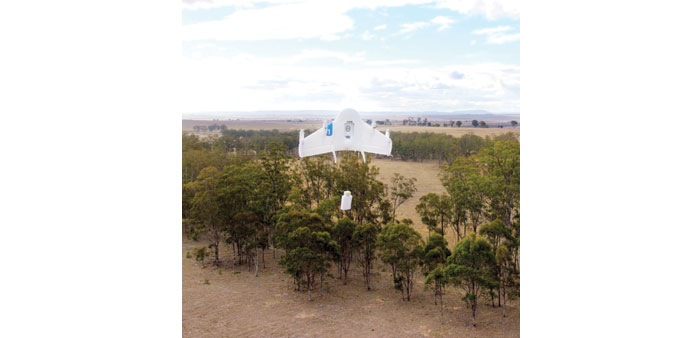By Andrej Sokolow
Things could get crowded in the sky. Internet companies Google and Amazon are developing robotic drones to deliver parcels. The aim is to be able to deliver virtually anything by air within one or two minutes, says Google X director Astro Teller.
The drive to build a delivery drone that does its job reliably and without harm has to be taken seriously, given that heavyweight companies like these are putting serious effort into them.
Company co-founder Sergey Brin has been a driving force behind Google’s drone project, called Project Wing.
Nevertheless there are many open questions. Would individual deliveries from the air really be economically viable? How should new rules on regulating automated traffic in the skies be formulated?
How do you deal with the risk of drones crashing into each other, into other aircraft or objects on the ground? Would communication with the drones cause electromagnetic interference? How can they be made proof against theft, sabotage or use for purposes of terrorism?
The companies acknowledge that it will take years to solve the technical and legal problems, but both Google and Amazon have the political clout to insist that regulators don’t just ban the plan outright.
“We believe that speed is key to changing people’s consumption patterns fundamentally,” Teller, who runs the secretive Google-X laboratory, recently told the German daily Berliner Zeitung.
His laboratory produced projects like Project Glass, which provides data to the wearer via a tiny display in a pair of spectacles, and Project Loon, which is intended to take the internet to remote regions using balloons.
When Amazon first presented its drone project in December, there was widespread scepticism, but also keen interest from some quarters.
Deutsche Post, now the world’s largest logistical company, responded by testing deliveries of medications by drone from a pharmacy to its headquarters on the other side of the Rhine river in Bonn, Germany.
US pizza chain Domino’s has shown that pizzas can be delivered per “DomiCopter,” and a New Yorker has filmed a drone taking his dog for a walk.
In current tests in the wide open spaces of Australia, Google’s Project Wing is testing an 8.5-kilogram aircraft that rests on the ground with its propellers pointed straight up, but then switches into a horizontal position when flying.
Google X and its current trials clearly do not mimic the difficulties involved in operating over densely populated cities.
But those involved are convinced that the obstacles can be overcome. The system should be trialled initially in a small town to demonstrate functionality and safety, Teller told the Berliner Zeitung.
The range of goods on offer would then gradually be expanded.
Internet investor Marc Andreessen has suggested setting up a “Drone Valley” in the United States where regulations governing drone flights could be eased to facilitate intensive testing.
Enthusiasm for drones comes at a time of great change in established logistics caused by the internet companies.
Investors in Uber have placed the value of 17 billion dollars on the ride-share company, not so much because it will shake up the taxi industry, but also because it is predicted to expand its services into logistics.
“Once you’re sending around cars in five minutes, there are a lot of other things you can deliver in five minutes,” Uber chief executive Travis Kalanick says.
His company is now testing UberFresh in California, which delivers fresh food within 10 minutes. And in San Francisco the Postmates startup is offering low-cost courier services to everyone through its online platform.
“The logistics sector needs to take very seriously the Google and Amazon programmes for delivering parcels by drone,” Peter Russo, a professor at the European Business School told the Berliner Zeitung.
“The established companies in the sector are too fixated on improving their current business models, instead of thinking about how the sector can be fundamentally organized in a more efficient way through new technologies,” Russo said. -DPA

